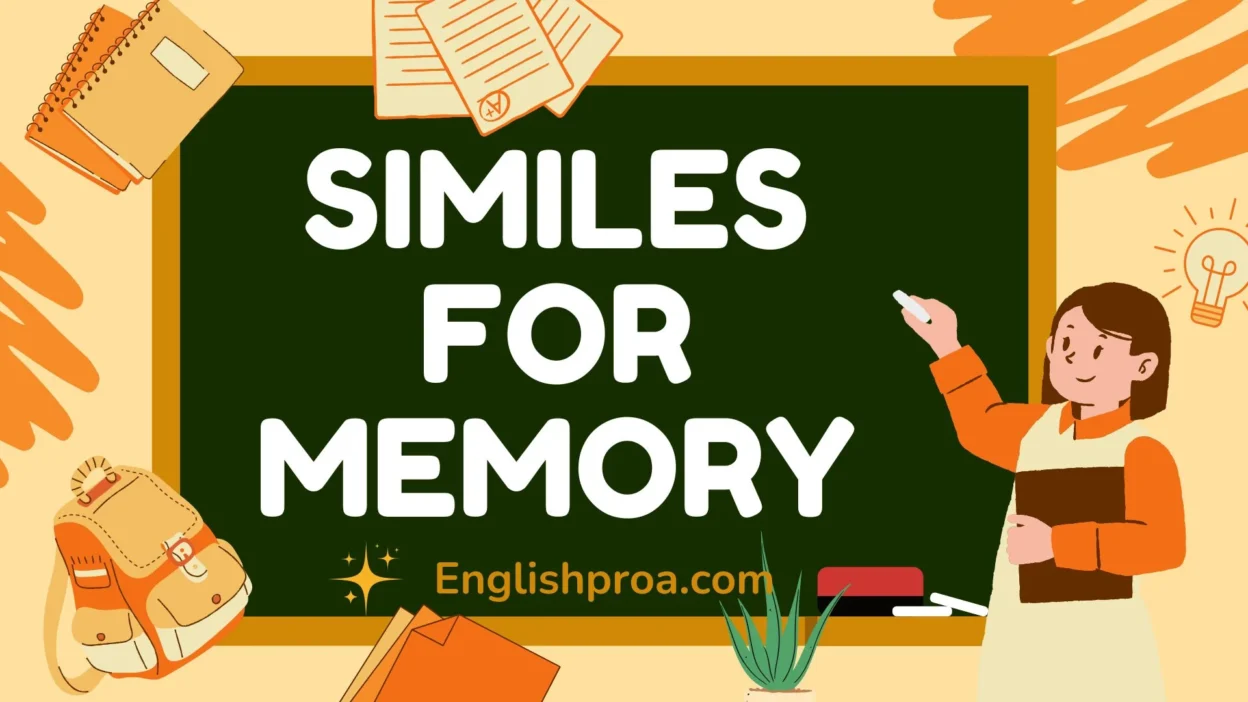Memory is such a tender and powerful part of our lives. It can bring a smile, a tear, or even the courage to move forward. When we talk about memory, we’re often reaching for ways to express something that’s deep, emotional, and human. Using similes—comparisons that make ideas more vivid—can help us express those moments with warmth and clarity.
As a writer and lifelong lover of words, I’ve often leaned on similes to describe memories that felt too important for plain language. Whether you’re writing a heartfelt letter, journaling about your past, or simply trying to comfort a friend, these 30 similes for memory will help you speak with empathy, care, and authenticity.
Like a photograph in a dusty album
Meaning: A memory that’s slightly faded but still treasured.
In a sentence: Her laughter echoed in my mind like a photograph in a dusty album.
Best use: For nostalgic, bittersweet recollections.
Not for: Vivid, recent memories.
Other ways to say: Like a faded picture, like an old snapshot
Like a song stuck in your head
Meaning: A memory that won’t go away, no matter how much time passes.
In a sentence: His words stayed with me like a song stuck in my head.
Best use: When recalling something repetitive or haunting.
Not for: Fleeting or casual memories.
Other ways to say: Like a looped melody, like a replaying tune
Like a shadow at dusk
Meaning: A memory that’s unclear but still follows you.
In a sentence: The moment lingered like a shadow at dusk.
Best use: For memories that feel eerie or hard to define.
Not for: Bright, clear recollections.
Other ways to say: Like a fading silhouette, like twilight
Like a book you’ve read a hundred times
Meaning: A familiar and comforting memory.
In a sentence: That summer felt like a book I’ve read a hundred times.
Best use: For cherished, repetitive experiences.
Not for: Unfamiliar or confusing events.
Other ways to say: Like a favorite story, like a worn paperback
Like a scent on the breeze
Meaning: A memory triggered unexpectedly.
In a sentence: Her perfume came back to me like a scent on the breeze.
Best use: For sensory memories.
Not for: Concrete or factual recollections.
Other ways to say: Like a passing fragrance, like a whisper of smell
Like a flame in the wind
Meaning: A fragile or fleeting memory.
In a sentence: That moment was like a flame in the wind—here, then gone.
Best use: For brief, delicate memories.
Not for: Strong or recurring memories.
Other ways to say: Like a flicker, like a candle in a storm
Like handwriting in the margins
Meaning: A memory that’s personal and intimate.
In a sentence: Our time together felt like handwriting in the margins.
Best use: For private or subtle recollections.
Not for: Loud or public events.
Other ways to say: Like a secret note, like a personal annotation
Like a scar that no longer hurts
Meaning: A painful memory that’s healed over time.
In a sentence: The loss is still there, like a scar that no longer hurts.
Best use: For growth and healing.
Not for: Fresh or unresolved emotions.
Other ways to say: Like a healed wound, like an old injury
Like a lighthouse in the fog
Meaning: A guiding memory during uncertain times.
In a sentence: Her advice stayed with me like a lighthouse in the fog.
Best use: For memories that provide direction.
Not for: Disorienting or confusing events.
Other ways to say: Like a beacon, like a signal in the dark
Like a mirror from the past
Meaning: A memory that reflects who you were.
In a sentence: That photo was like a mirror from the past.
Best use: For introspection.
Not for: Forgettable or superficial things.
Other ways to say: Like a time reflection, like a past version of me
Like rain on a windowpane
Meaning: A soft, melancholic memory.
In a sentence: His goodbye was like rain on a windowpane—quiet but present.
Best use: For sad or poetic reflections.
Not for: Exciting or joyful moments.
Other ways to say: Like soft rain, like a drizzle of emotion
Like a song you forgot you loved
Meaning: A joyful memory rediscovered.
In a sentence: That conversation felt like a song I forgot I loved.
Best use: For pleasant surprises.
Not for: Repetitive or known moments.
Other ways to say: Like a hidden gem, like a rediscovered tune
Like footsteps in the sand
Meaning: A memory that slowly fades with time.
In a sentence: Our beach trip lingers like footsteps in the sand.
Best use: For slowly vanishing recollections.
Not for: Permanent or engraved memories.
Other ways to say: Like a trail that disappears, like fading marks
Like a whisper in a crowded room
Meaning: A memory that’s hard to hear over life’s noise.
In a sentence: That promise echoed like a whisper in a crowded room.
Best use: For quiet or subtle moments.
Not for: Loud or dramatic experiences.
Other ways to say: Like a soft echo, like a quiet thought
Like pages torn from a diary
Meaning: Private or emotional memories, sometimes lost.
In a sentence: Those teenage years were like pages torn from a diary.
Best use: For deeply personal stories.
Not for: Shared or public recollections.
Other ways to say: Like secrets, like unwritten truths
Like stars on a clear night
Meaning: Beautiful, distant memories.
In a sentence: Their kindness shone like stars on a clear night.
Best use: For awe-inspiring or lovely reflections.
Not for: Harsh or painful thoughts.
Other ways to say: Like constellations, like twinkling memories
Read More: 30 Idioms for Smart
Like an echo in the canyon
Meaning: A memory that repeats in your mind.
In a sentence: His voice still comes back like an echo in the canyon.
Best use: For powerful or unresolved thoughts.
Not for: Fleeting or forgotten events.
Other ways to say: Like a lingering sound, like a bounce-back thought
Like melted ice cream
Meaning: A sweet moment that didn’t last.
In a sentence: That summer fling was like melted ice cream—sweet but quick.
Best use: For bittersweet memories.
Not for: Enduring or solid recollections.
Other ways to say: Like a quick treat, like a sugar rush
Like a quilt made of moments
Meaning: A patchwork of warm memories.
In a sentence: Our family is stitched together like a quilt made of moments.
Best use: For collective memories.
Not for: Isolated or singular events.
Other ways to say: Like a memory blanket, like stitched stories
Like a firefly in a jar
Meaning: A memory you’ve captured and hold close.
In a sentence: Her smile lives on like a firefly in a jar.
Best use: For precious, preserved moments.
Not for: Forgotten or overlooked memories.
Other ways to say: Like a caught spark, like bottled light
Like wind through tall grass
Meaning: A memory that’s hard to hold onto.
In a sentence: That day drifted away like wind through tall grass.
Best use: For gentle, fleeting recollections.
Not for: Strong, vivid events.
Other ways to say: Like passing air, like rustling leaves
Like a song lyric that hits home
Meaning: A memory that resonates deeply.
In a sentence: Her goodbye struck like a song lyric that hits home.
Best use: For emotional, personal connections.
Not for: Impersonal or generic thoughts.
Other ways to say: Like a relatable line, like a heart lyric
Like an unfinished sentence
Meaning: A memory without closure.
In a sentence: That relationship ended like an unfinished sentence.
Best use: For unresolved experiences.
Not for: Completed or clear events.
Other ways to say: Like an open ending, like a pause mid-thought
Like leaves in the wind
Meaning: Scattered and drifting memories.
In a sentence: Those early childhood days are like leaves in the wind.
Best use: For memories that don’t come in order.
Not for: Chronological or structured stories.
Other ways to say: Like scattered pieces, like drifting thoughts
Like dew on morning grass
Meaning: A fresh but delicate memory.
In a sentence: That first kiss was like dew on morning grass.
Best use: For innocent, early moments.
Not for: Harsh or cynical recollections.
Other ways to say: Like a morning glow, like soft beginnings
Like a key without a lock
Meaning: A memory that doesn’t quite make sense.
In a sentence: That strange encounter felt like a key without a lock.
Best use: For mysterious or puzzling thoughts.
Not for: Clear, explainable memories.
Other ways to say: Like a mismatch, like a missing piece
Like the smell of old books
Meaning: A comforting, vintage memory.
In a sentence: Her stories are like the smell of old books—timeless and warm.
Best use: For cozy, intellectual nostalgia.
Not for: Fast-paced or modern feelings.
Other ways to say: Like a library scent, like dusty stories
Like roots under the soil
Meaning: A memory that shapes who you are.
In a sentence: That childhood lesson stayed like roots under the soil.
Best use: For formative experiences.
Not for: Surface-level memories.
Other ways to say: Like a foundation, like buried strength
Like stars you can’t name
Meaning: Vivid but unexplainable memories.
In a sentence: That dream stayed with me like stars I can’t name.
Best use: For surreal or dreamy experiences.
Not for: Rational, grounded memories.
Other ways to say: Like untitled feelings, like unnamed lights
Like a film reel in slow motion
Meaning: A memory replayed with focus and emotion.
In a sentence: The accident plays back like a film reel in slow motion.
Best use: For dramatic, detailed moments.
Not for: Fast, fleeting experiences.
Other ways to say: Like a cinematic memory, like a slow scene
Conclusion: Let Your Memories Speak Gently
Words matter—especially when they hold memories. These 30 similes for memory are more than just creative comparisons; they’re ways to speak from the heart. Whether you’re reflecting in a journal, writing a story, or comforting someone you love, the right simile can carry meaning, warmth, and empathy far beyond what plain words can.
As someone who often writes to process life’s ups and downs, I know the value of choosing just the right phrase. I hope these similes help you connect, heal, and express your memories with a little more grace.
FAQs
FAQ 1: What is a simile and how does it help describe memory?
A simile is a figure of speech that compares two different things using the words “like” or “as.” It helps describe memory by making abstract or emotional experiences feel more relatable and vivid through familiar imagery.
FAQ 2: Why should I use similes when talking about memories?
Using similes adds depth, emotion, and clarity to your writing. Memories are often tied to feelings, and similes help you express those feelings in a more empathetic and creative way, which can resonate more deeply with others.
FAQ 3: Can these similes be used in professional writing, like memoirs or essays?
Absolutely. Many of these similes are literary-friendly and suitable for memoirs, personal essays, or even creative non-fiction. Just make sure they match the tone and context of your piece for the best effect.
FAQ 4: How do I choose the right simile for a specific memory?
Think about the feeling behind the memory—Is it nostalgic? Painful? Joyful? Once you’ve pinpointed the emotion, choose a simile that visually and emotionally matches that tone. For example, use “like rain on a windowpane” for a gentle, sad memory, or “like a song you forgot you loved” for a joyful rediscovery.
FAQ 5: Are similes better than metaphors when writing about memory?
Not better—just different. Similes make comparisons more explicit (using like or as), which can be helpful when you want your meaning to be clear and accessible. Metaphors, on the other hand, are more subtle. Both are powerful tools; similes are great for making immediate emotional connections with readers.





